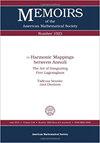Spectral Properties of Ruelle Transfer Operators for Regular Gibbs Measures and Decay of Correlations for Contact Anosov Flows
IF 2.4
4区 数学
Q1 MATHEMATICS
引用次数: 8
Abstract
In this work we study strong spectral properties of Ruelle transfer operators related to a large family of Gibbs measures for contact Anosov flows. The ultimate aim is to establish exponential decay of correlations for Hölder observables with respect to a very general class of Gibbs measures. The approach invented in 1997 by Dolgopyat in “On decay of correlations in Anosov flows” and further developed in Stoyanov (2011) is substantially refined here, allowing to deal with much more general situations than before, although we still restrict ourselves to the uniformly hyperbolic case. A rather general procedure is established which produces the desired estimates whenever the Gibbs measure admits a Pesin set with exponentially small tails, that is a Pesin set whose preimages along the flow have measures decaying exponentially fast. We call such Gibbs measures regular. Recent results in Gouëzel and Stoyanov (2019) prove existence of such Pesin sets for hyperbolic diffeomorphisms and flows for a large variety of Gibbs measures determined by Hölder continuous potentials. The strong spectral estimates for Ruelle operators and well-established techniques lead to exponential decay of correlations for Hölder continuous observables, as well as to some other consequences such as: (a) existence of a non-zero analytic continuation of the Ruelle zeta function with a pole at the entropy in a vertical strip containing the entropy in its interior; (b) a Prime Orbit Theorem with an exponentially small error.正则Gibbs测度的Ruelle传递算子的谱性质及接触ansov流的相关衰减
在这项工作中,我们研究了与接触Anosov流的一大类Gibbs测度有关的Ruelle转移算子的强谱性质。最终目的是建立Hölder可观察性相对于一类非常一般的吉布斯测度的相关性的指数衰减。Dolgopyat于1997年在“Anosov流中相关性的衰减”中发明并在Stoyanov(2011)中进一步发展的方法在这里得到了实质性的改进,允许处理比以前更普遍的情况,尽管我们仍然将自己限制在一致双曲的情况下。建立了一个相当一般的程序,每当吉布斯测度允许具有指数小尾的Pesin集时,该程序就会产生所需的估计,即Pesin集合的前图像具有指数快速衰减的测度。我们称这种吉布斯测度为正则测度。Gouëzel和Stoyanov(2019)的最新结果证明了由Hölder连续势确定的各种吉布斯测度的双曲微分同胚和流的Pesin集的存在性。Ruelle算子的强谱估计和成熟的技术导致了Hölder连续可观察性的相关性的指数衰减,以及一些其他结果,例如:(a)Ruelle-zeta函数的非零解析连续性的存在,该函数的极点在其内部包含熵的垂直条带中的熵处;(b) 具有指数小误差的素数轨道定理。
本文章由计算机程序翻译,如有差异,请以英文原文为准。
求助全文
约1分钟内获得全文
求助全文
来源期刊
CiteScore
3.50
自引率
5.30%
发文量
39
审稿时长
>12 weeks
期刊介绍:
Memoirs of the American Mathematical Society is devoted to the publication of research in all areas of pure and applied mathematics. The Memoirs is designed particularly to publish long papers or groups of cognate papers in book form, and is under the supervision of the Editorial Committee of the AMS journal Transactions of the AMS. To be accepted by the editorial board, manuscripts must be correct, new, and significant. Further, they must be well written and of interest to a substantial number of mathematicians.

 求助内容:
求助内容: 应助结果提醒方式:
应助结果提醒方式:


